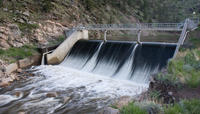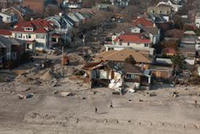-
Spotting potential targets of nefarious e-mail attacks
The weakest link in many computer networks is a gullible human. With that in mind, computer science researchers want to figure out how to recognize potential targets of nefarious e-mails and put them on their guard.
-
-
The sobering reality of water security
Agriculture is one of the world’s most insatiable consumers of water. Yet, it is facing growing competition for water from cities, industry, and recreation at a time when demand for food is rising, and water is expected to become increasingly scarce.
-
-
Chinese government orchestrates cyberattacks on U.S.: experts
For more than a decade now, China has engaged in a sustained, systemic, and comprehensive campaign of cyber attacks against the United States. The Chinese government has enlisted China’s sprawling military and civilian intelligence services, with their armies of cyber-specialists, in a cyber-campaign aiming to achieve three goals: steal Western industrial secrets and give them to Chinese companies, so these companies could compete and weaken their Western rivals; hasten China’s march toward regional, then global, economic hegemony; achieve deep penetration of U.S. critical infrastructure in order to gain the ability to disrupt and manipulate American critical infrastructure – and paralyze it during times of crisis and conflict. A detailed 60-page study, to be released today , offers, for the first time, proof that the most sophisticated Chinese hacker groups, groups conducting the most threatening attacks on the United States, are affiliated with the headquarters of China’s military intelligence lead unit — PLA Unit 61398.
-
-
Good safety and security culture essential in workplace
Safety & Security Asia 2013 to be held in Singapore on 7-9 May 2013, will attract 600 exhibitors from thirty countries and more than 10,000 visitors from forty countries. Networking sessions, conferences, and seminars will create a platform for industry professionals to share their experiences and gather more insights on the latest trends in the safety and security arena.
-
-
US/Canada Border Conference set for 12-13 September
The US/Canada Border Conference, which will meet in Detroit on 12-13 September, is a comprehensive two-day educational program and exhibition which focuses on implementation of the Beyond the Border. An advisory board will direct the development of the educational program, recruiting a slate of speakers to share their knowledge and experience with those tasked with border security. Board members include former U.S. Customs & Border Protection, U.S. Coast Guard, Royal Canadian Mounted Police, and Canada Border Services Agency, and industry representatives.
-
-
Infrastructure renewal in regional Australia
New research in Australia calls for the establishment of a new national organization to tackle the shortfall in infrastructure investment and boost the regions’ capacity to contribute to national economic growth. Expert say the new organization, to be called Local Infrastructure Australia, would be the most effective way of overcoming the backlog in local government infrastructure investment now estimated at between $12 and $15.5 billion.
-
-
Legislation to require Internet privacy baseline not around the corner
The European Union has set tough privacy protection laws and is even considering a proposal which would set even stricter requirements on Internet companies, including allowing users to access and delete data collected on them. The United States, however, has very few privacy protection laws. Some argue this is a good thing.
-
-
Infrastructure sees drop in funding last year
Infrastructure investments in roads, bridges, and power stations have dropped significantly in 2012 as banks struggled to offer long-term debt and governments targeted cost savings. There were hopes that infrastructure spending would boost the world economy in 2012, but funding fell from $159 billion worldwide in 2011 to $99 billion.
-
-
Idaho debating nuclear waste storage
For two decades, the Yucca mountain nuclear waste repository in Nevada was viewed as a long-term solution to the growing problem of radioactive waste generated by the 104 active nuclear power generation plants in the United States. One of the Obama administration’s first acts was to “defund” the project, in effect outing an end to it. States such as Texas, New Mexico, and North Carolina have fashioned their own interim solution to the problem of nuclear waste storage, and the governor of Idaho wants his state to follow these states’ example.
-
-
Hydroelectric power generation superior to nuclear and coal, beats oil and gas

Researchers have reviewed the economic, social, and environmental impact of hydro, coal, oil, gas, and nuclear power. Each has its advantages and disadvantages, but of these conventional electricity generation technologies, hydroelectric power appears to be the most sustainable and acceptable environmentally and economically.
-
-
Old, faulty bores jeopardize Australia's water
Australian homes, towns, cities, farmers, and miners will rely increasingly on underground water as the country’s population grows, surface water supplies dwindle, and as droughts multiply under a warming climate. Trouble is, the authorities in charge do not have a clear idea exactly how much groundwater there is, how rapidly it is recharged — or how quickly it is being depleted. What is known is based on data largely supplied by 23,000 monitoring bores spread across the continent — more than two thirds of which are now falling into disrepair.
-
-
Salt Lake Community College to offer homeland security program
According to statistics from the U.S. Department of Labor, the need for emergency management professionals, protective service workers, and police and sheriff’s patrol officers is likely to increase more than 33 percent between 2011 and 2018. The Utah Board of Regents has approved the first Homeland Security and Emergency Management associate of applied degree in the state at Salt Lake Community College (SLCC).
-
-
NY to buy, demolish beachfront homes, make way for storm buffers

New York governor Andrew Cuomo plans to use $400 million in federal funding to buy beachfront homes as part of a broader plan to reshape the New York coastline so the state is better prepared for sea level rise, surges, and storms. The plan is to raze the purchased homes and leave to shore front vacant. Some properties would be turned into dunes, wetlands, or other natural buffers. Other parcels could be combined and turned into public parkland.
-
-
More states consider laws to limit the use of drones by police

The Federal Aviation Administration (FAA) appears ready to allow the use of drones in the United States, by both law enforcement agencies and private citizens, almost with no restrictions. Experts predict that by the end of the decade, there will be about 30,000 drones flying over the United States. Legislators in at least eleven states want to impose limits on the use of UAVs as worries grow that the unregulated use of drones would erode the liberties of Americans.
-
-
Massachusetts moves against unscrupulous compounding pharmas
State regulators in Massachusetts have shut down or cited thirty-two of the state’s forty compounding pharmacies as a result of a nationwide fungal meningitis outbreak. The outbreak killed forty-five people and sickened 696, who required hospitalization.
-
More headlines
The long view
Ransomware Attacks: Death Threats, Endangered Patients and Millions of Dollars in Damages
A ransomware attack on Change Healthcare, a company that processes 15 billion health care transactions annually and deals with 1 in 3 patient records in the United States, is continuing to cause massive disruptions nearly three weeks later. The incident, which started on February 21, has been called the “most significant cyberattack on the U.S. health care system” by the American Hospital Association. It is just the latest example of an increasing trend.
Chinese Government Hackers Targeted Critics of China, U.S. Businesses and Politicians
An indictment was unsealed Monday charging seven nationals of the People’s Republic of China (PRC) with conspiracy to commit computer intrusions and conspiracy to commit wire fraud for their involvement in a PRC-based hacking group that spent approximately 14 years targeting U.S. and foreign critics, businesses, and political officials in furtherance of the PRC’s economic espionage and foreign intelligence objectives.
European Arms Imports Nearly Double, U.S. and French Exports Rise, and Russian Exports Fall Sharply
States in Europe almost doubled their imports of major arms (+94 per cent) between 2014–18 and 2019–23. The United States increased its arms exports by 17 per cent between 2014–18 and 2019–23, while Russia’s arms exports halved. Russia was for the first time the third largest arms exporter, falling just behind France.
LNG Exports Have Had No Impact on Domestic Energy Costs: Analysis
U.S. liquified natural gas (LNG) exports have not had any sustained and significant direct impact on U.S. natural gas prices and have, in fact, spurred production and productivity gains, which contribute to downward pressure on domestic prices.
